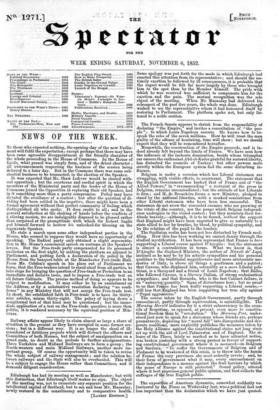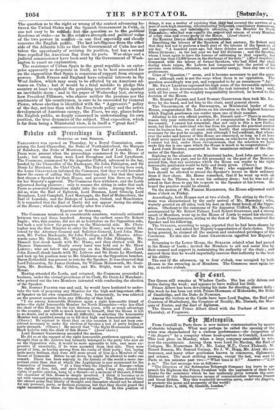The exposigon of American dynamics, somewhat suddenly vo- lunteered by
the Times on Wednesday last, was a political fact not less important than the declaration which we have just quoted. The question as to the right or wrong of the contest advancing be- tween the United States and the Spanish Government in Cuba, is one not easy to be settled; but 4he question as to the political freedoms at stake—as to the relative strength and political value of the two powers in conflict—is -one that especially and closely concerns the English public. The last intelligence ,from the other side of the Atlantic tells us that the Government of Cuba has not taken the opportunity of revising its position, but has a second time repelled the American flag from its ports. War-ships and a judicial commissioner have been sent by the Government of Wash- ington to exact an explanation. he resistance of Cuban Spain to the great republic is an enter- -prise apparently so desperate in itself, as to be beat accounted for on the supposition that Spain is conscious of support from stronger powers. Both France and England have colonial interests in the 'West Indies, which may seem to be affected by an American ad- vance on Cuba ; but it would be a fatal mistake to pledge this country at least to uphold the perishing interests of Spain against an inevitable doom : and in the paper of Wednesday last, showing how President Fillmore, who shares neither the passions nor the sentiments of his countrymen, is sure to be succeeded by General Pieroe, whose election is identified with the " Aggressive" policy of the day, not less than with the Free-trade policy and the active development of American energy, the Times, we say, places before the English public, so deeply concerned in understanding its own position, the true dynamics of the subject. That exposition, which is far from being a Ministerial view, is in itself a " great fact."



























